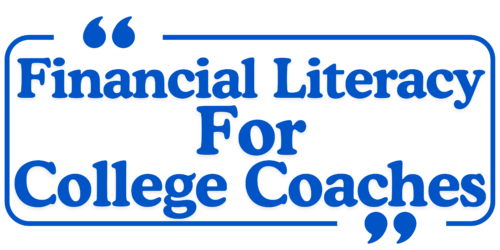Curriculum: Financial Goal Setting Literacy for Coaches
This curriculum focuses on helping coaches develop the skills and knowledge needed to set, pursue, and achieve their financial goals effectively. Coaches will learn how to create a structured financial plan that aligns with their personal and professional aspirations.
Module 1: Understanding Financial Goals
Learning Objectives:
- Define what financial goals are and why they are important.
- Differentiate between short-term, medium-term, and long-term goals.
- Assess personal values and priorities to inform goal-setting.
Topics Covered:
- What Are Financial Goals? An Overview
- The Importance of Setting Financial Goals: Motivation and Direction
- Types of Financial Goals: Short-Term, Medium-Term, Long-Term
- Aligning Goals with Personal Values and Aspirations
Module 2: Assessing Your Current Financial Situation
Learning Objectives:
- Conduct a thorough assessment of your current financial status.
- Identify strengths and weaknesses in your financial picture.
- Understand cash flow, assets, liabilities, and net worth.
Topics Covered:
- Evaluating Your Income and Expenses: Creating a Personal Budget
- Understanding Your Net Worth: Assets vs. Liabilities
- Analyzing Cash Flow: Income Streams and Outflows
- Tools for Financial Assessment: Worksheets and Calculators
Module 3: SMART Goal Framework
Learning Objectives:
- Learn how to create SMART (Specific, Measurable, Achievable, Relevant, Time-bound) financial goals.
- Understand the importance of specificity and measurement in goal-setting.
- Develop realistic timelines for achieving financial goals.
Topics Covered:
- Introduction to SMART Goals: A Practical Framework
- Crafting Specific Financial Goals: Clarity and Precision
- Setting Measurable Targets: Tracking Progress Effectively
- Ensuring Achievability: Realistic Expectations and Planning
- Relevant Goals: Aligning with Life and Career Objectives
- Timelines: Establishing Deadlines for Achievement
Module 4: Creating a Financial Action Plan
Learning Objectives:
- Develop a step-by-step action plan to achieve financial goals.
- Identify necessary resources and strategies to reach these goals.
- Learn how to adjust the action plan as circumstances change.
Topics Covered:
- Breaking Down Goals into Actionable Steps: A Roadmap
- Identifying Resources: Financial, Educational, and Support Systems
- Developing Strategies for Each Goal: Prioritization and Focus
- Flexibility in Your Plan: Adapting to Changes and Challenges
Module 5: Accountability and Monitoring Progress
Learning Objectives:
- Understand the importance of accountability in achieving financial goals.
- Learn how to monitor progress regularly and adjust goals as needed.
- Develop support systems and resources for maintaining accountability.
Topics Covered:
- The Role of Accountability: Coaches and Mentors
- Setting Up a Monitoring System: Tracking Progress Over Time
- Adjusting Goals and Plans: When to Reassess and Modify
- Utilizing Accountability Partners and Support Groups
Module 6: Overcoming Obstacles and Challenges
Learning Objectives:
- Identify common obstacles to achieving financial goals.
- Learn strategies for overcoming challenges and setbacks.
- Develop resilience and adaptability in financial planning.
Topics Covered:
- Common Financial Challenges for Coaches: Income Variability, Expenses
- Strategies for Overcoming Obstacles: Problem-Solving Techniques
- Building Resilience: Staying Motivated During Difficult Times
- Learning from Setbacks: Turning Challenges into Opportunities
Module 7: Celebrating Success and Reviewing Goals
Learning Objectives:
- Understand the importance of celebrating achievements in financial goal-setting.
- Learn how to review and evaluate completed goals for future improvement.
- Set new financial goals based on previous experiences and lessons learned.
Topics Covered:
- Recognizing and Celebrating Achievements: Motivation and Reinforcement
- Reviewing Completed Goals: What Worked and What Didn’t
- Setting New Goals: Building on Success and Learning from Experience
- Continuous Improvement: The Cycle of Financial Goal Setting
Module 8: Final Assessment and Personalized Financial Plan
Final Assessment: Participants will create a personalized financial goal-setting plan, including their defined goals, action steps, and accountability measures.
Certification: Upon completion, participants will receive a certification in Financial Goal Setting Literacy for Coaches, empowering them to pursue and achieve their financial aspirations effectively.
This Financial Goal Setting Literacy curriculum equips coaches with the tools and knowledge necessary to set, pursue, and achieve their financial goals, enabling them to build a secure and successful financial future.
